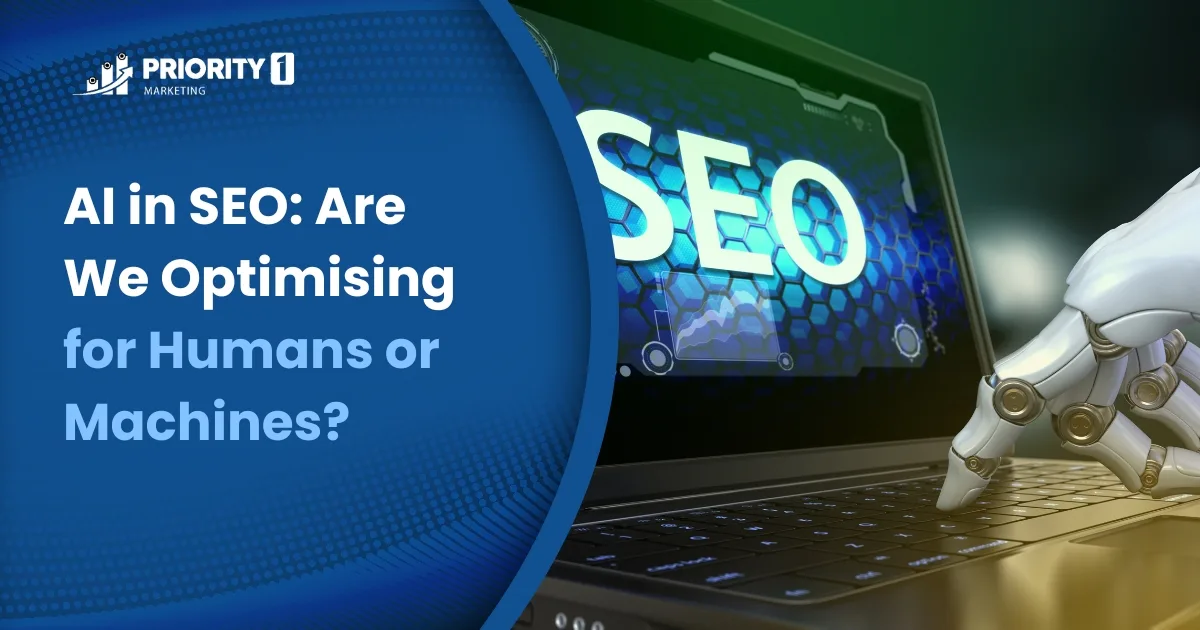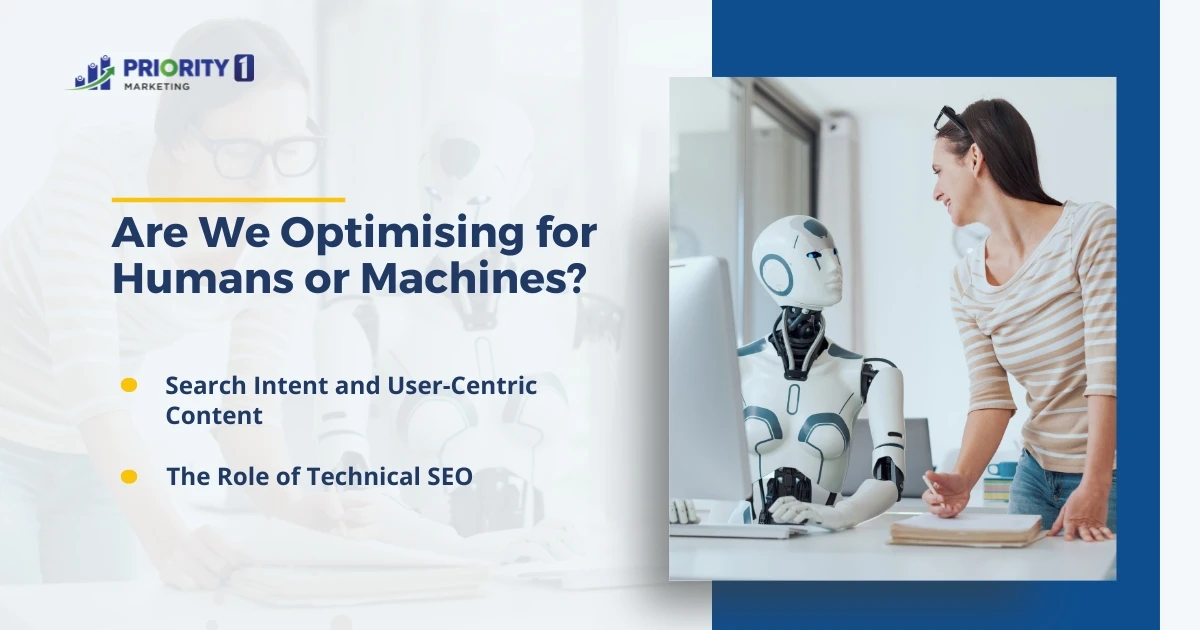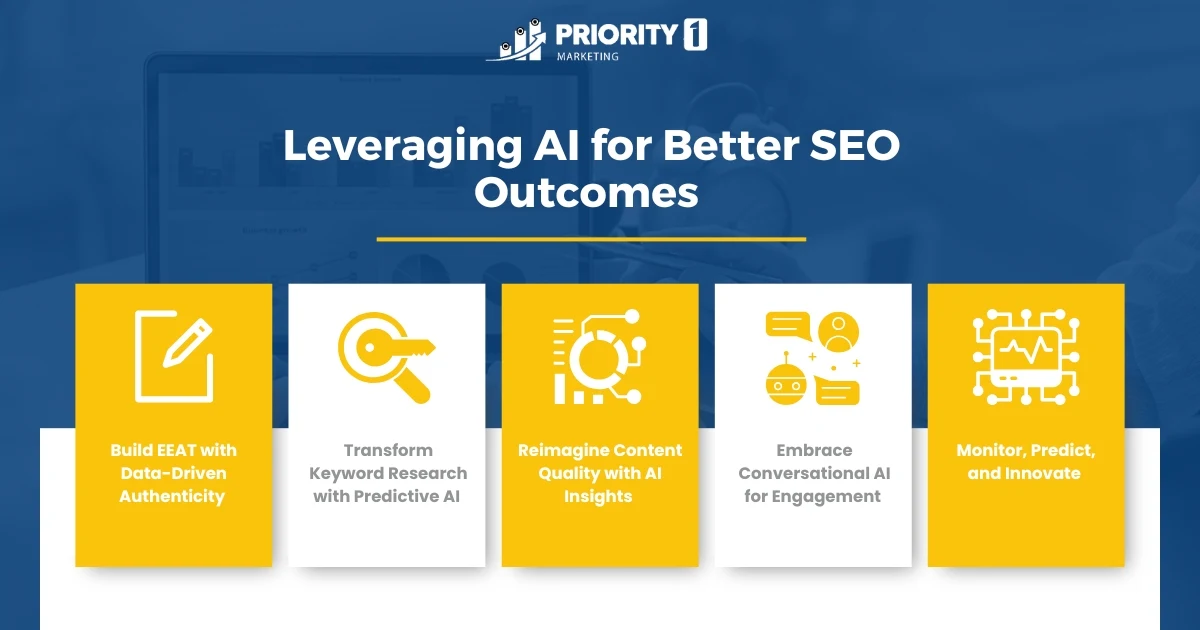
AI in SEO: Are We Optimising for Humans or Machines?
“The best marketing doesn’t feel like marketing.” – Tom Fishburne
In today’s fast-changing digital world, artificial intelligence (AI) is reshaping the way we optimise websites for search engines. But let’s take a step back—are we really moving closer to providing meaningful solutions for real people, or are we just trying to please the algorithms? This blog dives into how AI is changing SEO and asks the important question: are we prioritising human needs, or are we letting machines set the agenda?
AI’s influence doesn’t stop with SEO. It’s also making waves in other areas of digital marketing, like social media, pay-per-click (PPC) advertising, and email marketing. Here’s a quick look at both the pros and the challenges it brings:
- Social Media: AI helps personalise our feeds and analyse trends, giving users tailored content. But there’s a flip side—AI-driven algorithms can create echo chambers and make it harder for businesses to reach people organically.
- PPC Advertising: AI takes the guesswork out of bidding strategies and predicts how well ads will perform. Yet, too much automation can mean less control over ad placements, which might lead to some awkward or irrelevant results.
- Email Marketing: With AI, emails feel more personalised and arrive at just the right moment. But if everything is automated, there’s a risk they might lose that human touch and come across as cold or robotic.
In the bigger picture, AI is undeniably transforming digital marketing. It’s changing how we connect with people across platforms, offering exciting possibilities while reminding us to strike a balance between technology and the human experience.
The Current AI-Driven SEO Landscape
The integration of AI in SEO is revolutionising how businesses approach search engine optimisation. Tools powered by machine learning and natural language processing (NLP) are now essential for analysing search intent, predicting user behavior, and enhancing content relevance.
A 2024 study (credits: SurveyMonkey) revealed that over 70% of marketers now use AI-driven tools to guide their SEO strategies. Whether it’s understanding the nuances of user intent or generating content ideas, AI is enabling SEO professionals to work smarter and faster. For instance, Brisbane SEO agencies have embraced AI to tailor strategies for local businesses, improving visibility in the fiercely competitive local search market.
Are We Optimising for Humans or Machines?

While AI enhances efficiency, the question remains: are our efforts truly human-centric? The answer lies in understanding the balance between technical optimisation and user experience.
1. Search Intent and User-Centric Content
AI tools like Google’s RankBrain and BERT have made it clear that content quality and relevance are paramount. These algorithms prioritise pages that address user intent rather than those stuffed with keywords.
For example, an SEO company in Sydney might leverage AI to analyse search patterns, identifying that users searching for “best coffee shops” also look for “menu variety” and “parking availability.” By addressing these nuances, businesses can create content that resonates with human audiences.
2. The Role of Technical SEO
From structured data to core web vitals, optimising for machines remains crucial. AI-driven tools like Screaming Frog and SEMrush are indispensable for auditing websites, identifying errors, and ensuring compliance with Google’s guidelines. However, the ultimate goal of these technical optimisations is to enhance user experience – faster load times, mobile-friendly interfaces, and intuitive navigation all serve the end user.
A Melbourne SEO company, for instance, might use AI to identify and fix website issues that hinder user engagement, ensuring both search engines and humans benefit.
Perspectives from Australia’s Digital Marketing Community
Digital marketing experts across Australia are witnessing AI’s transformative impact firsthand.
Brisbane
Brisbane’s digital marketers highlight AI’s role in hyper-local targeting. SEO agencies in the region use AI to analyse local search trends, ensuring businesses rank higher in “near me” queries. According to one Brisbane-based expert, “AI allows us to anticipate user needs, but the challenge lies in maintaining authenticity and not sounding robotic.”
Melbourne
Melbourne SEO professionals emphasise AI’s contribution to content creation. AI tools help generate blog topics, meta descriptions, and even full articles. However, as one Melbourne marketer points out, “AI can’t replicate human creativity. The real value comes from blending AI insights with a human touch.”
Sydney
In Sydney, the focus is on AI-powered analytics. SEO companies here leverage predictive analytics to forecast trends and craft proactive strategies. A leading Sydney marketer observes, “AI is invaluable for analysing data at scale, but the ultimate goal is still to create connections with our audience.”
Leveraging AI for Better SEO Outcomes
1. Build EEAT with Data-Driven Authenticity
Focus on creating content that combines storytelling with verifiable insights. Use AI tools to identify audience pain points and craft narratives that resonate emotionally while showcasing expertise through credible sources, interactive content, and real-world examples.
2. Transform Keyword Research with Predictive AI
Move beyond traditional keyword tools by using predictive AI platforms that analyse user behavior trends. Brisbane SEO agencies, for instance, utilise these tools to identify emerging queries like “sustainable SEO practices” or “AI in local search” that align with evolving user interests.
3. Reimagine Content Quality with AI Insights
Leverage AI to identify untapped content opportunities and improve audience targeting. For instance, Melbourne SEO professionals might use AI to refine content formats—such as interactive infographics or video explainers—to better engage diverse audience segments.
4. Embrace Conversational AI for Engagement
With advancements in AI, tools like ChatGPT and voice assistants are transforming user interactions. Optimise content for conversational AI by integrating long-tail keywords, natural language queries, and dynamic FAQs. This strategy not only improves voice search rankings but also enhances user satisfaction by delivering intuitive and personalised experiences.
5. Monitor, Predict, and Innovate
SEO is ever-evolving. Go beyond static monitoring by leveraging AI-driven predictive analytics to anticipate trends and user behavior shifts. Use these insights to innovate your strategies proactively, ensuring your approach stays ahead of algorithm changes and audience expectations.
The Road Ahead
AI is undoubtedly reshaping SEO, but the core principles remain unchanged: deliver value to users, answer their questions, and solve their problems. While algorithms may evolve, the human need for authentic, relevant, and high-quality content remains constant.
As businesses in Brisbane, Melbourne, Sydney, and beyond navigate this AI-driven era, the key to success lies in striking a balance. By optimising for both humans and machines, we can create digital experiences that resonate with audiences and achieve sustainable results.
In conclusion, AI is not a replacement for human ingenuity but a powerful ally. By leveraging its capabilities while staying true to the principles of user-centricity, businesses can thrive in the ever-changing world of SEO.


